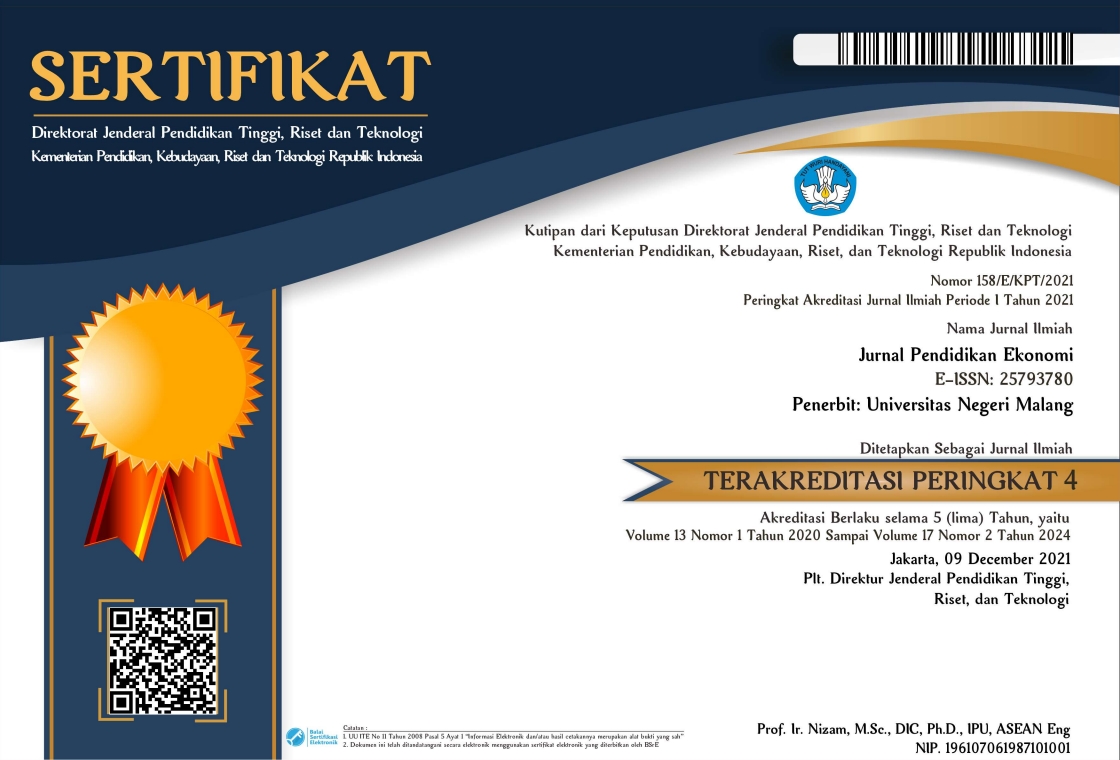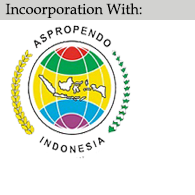Pengaruh Motivasi dan Sarana Belajar Online Terhadap Kemandirian Belajar Mahasiswa FEB Institut Asia di Masa Pandemi Covid-19
Abstract
Since the implementation of the lockdown (PSBB) policy in Indonesia, the student learning process in all levels of education in Indonesia have been carried out online. This has also been the case at the Business and Economic Faculty of Asia Institute, Malang. All of the students had to study from home (SFH) and interact with lecturers using online media such as Google Classroom, WhatsApp Group, Google Meet, Zoom and even application such as Discord using a laptop or a smartphone. Online learning during the Covid-19 pandemic became the only option to continue learning. Interestingly, online learning asserts high student independence. The purpose of this study was to determine the impact of online learning on students’ motivation and (learning) independence in the Faculty of Business and Economics of Asia Institute of Technology and Business, Malang. A total of 701 students were selected as respondents using simple random sampling technique. Data were collected through 5-point Likert scale questionnaires, then processed and analyzed using SEM-PLS analysis with SmartPLS 3.3.2 software. The results showed that both motivation and learning facilities were positively and significantly effected on student learning independence. The higher the motivation and the more complete, effective, and quality learning facilities, the higher the student's learning independence is. The main obstacle in the learning process is the lack of internet connection/ data signals in several areas where students live, which makes online lectures laggard and less attractive. It is suggested for further research to investigate and analyze the mediating role of motivation in the relationship between learning facilities and student learning independence.
Keywords
Full Text:
PDFReferences
Afandi, Rifki. (2011). Intergrasi Pendidikan Karakter dalam Pendidikan IPS di SD. Jurnal Pedagogia, Vol. 1, No. 1 Desember 2011. Sidoarjo: UNMUH.
Arifayani,Yuli. (2015). Pengaruh Motivasi Belajar, Kemandirian Belajar, Lingkungan Teman Sebaya, Dan Perhatian Orang Tua Terhadap Prestasi Belajar Akuntansi Siswa Kelas X Smkypkk 1 Sleman Tahun Ajaran 2014/2015, Skripsi, Universitas Negeri Yogyakarta, Yogyakarta.
Bakar, Ramli. (2014). The Effect of Learning Motivation on Student’s Productive Competencies in Vocational High School, West Sumatra. International Journal of Asian Social Science. 4(6): 722-732.
Darmawanti, Aghniyaa. (2017). Pengaruh Motivasi Belajar Terhadap Kemandirian Belajar Pada Siswa Yang Dimediasi Oleh Kreativitas. Skripsi, UMM, Malang.
Garson, G. D. (2016). Partial Least Squares: Regression and Structural Equation Models. Asheboro, NC: Statistical Associates Publishers.
Hair, Joseph E., Jr. Et al. (2014). A Primer on Partial Least Squares Structural Equation Modelling (PLS-SEM). SAGE Publications, Inc. California, USA.
Handayani, Sri, Annisya’, dan Andy Prasetyo Wati. (2020). Peningkatan Kemandirian Belajar Mahasiswa di Masa Pandemi Covid-19 melalui Penerapan Blended learning pada Mata Kuliah Evaluasi Proses dan Hasil Belajar di Universitas Negeri Malang. Jurnal Pendidikan Ekonomi, 13(2), 152-164.
Handayani, Sri., Annisya dan Andy Prasetyo Wati. (2020). Peningkatan Kemandirian Belajar Mahasiswa di Masa Pandemi Covid-19 melalui Penerapan Blended learning pada Mata Kuliah Evaluasi Proses dan Hasil Belajar di Universitas Negeri Malang. Jurnal Pendidikan Ekonomi. 13 (2): 109 -121.
Jannati, Miftahul. (2016). Pengaruh Motivasi Belajar Dan Disiplin Terhadap Kemandirian Belajar Ekonomi Siswa Kelas Xi Ips Di Sma Negeri 11 Kota Jambi. Skripsi, Universitas Jambi, Jambi.
Jeffrey, Ignatius dan Ade Zein. (2017). The Effects of Achievement Motivation, Learning Discipline and Learning Facilities on Student Learning Outcomes. International Journal of Development Research. 07 (09): 15471-15478.
Kusumadewi, Rida Fironika, Sari Yustiana, dan Khoirotun Nasihah. (2020). Menumbuhkan Kemandirian Siswa Selama Pembelajaran Daring Sebagai Dampak Covid-19 di SD. Jurnal Riset Pendidikan Dasar, 7(13), pp: 7-19.
Mujisuciningtyas, Nunuk. (2014). Pengaruh Kemandirian Belajar Dan Sarana Prasarana Pembelajaran Terhadap Hasil Belajar Praktik Di SMK Negeri 2 Tuban. Jurnal Ekonomi Pendidikan Dan Kewirausahaan, Volume 2, Nomor 1, pp. 103-115.
Mustikasari, Rizki dan Ratri Harida. (2020). Apersepsi Pembelajaran Melalui Stand-Up Comedy Untuk Meningkatkan Motivasi Belajar Mahasiswa Dengan Metode Ceramah Di Stkip Pgri Ponorogo. Jurnal Pendidikan. 21 (2): 111-121.
Ningsih, Desak Made Rai. (2020). Pengaruh Metode Kuliah Online Terhadap Tingkat Pemahaman Materi Kuliah Hukum Investasi Pada Mahasiswa Universitas Teknologi Indonesia. Jurnal Pendidikan. 21 (2): 104-110.
Parni dan Agung Listiadi. (2020). Peran Motivasi Belajar Dalam Memoderasi Pemahaman Perpajakan, Intensitas Pemberian Tugas, Dan Kebiasaan Belajar Terhadap Hasil Belajar Akuntansi Perpajakan. Jurnal Pendidikan Ekonomi. 13 (2): 165-175.
Putrie, Chientya Annisa Rahman. (2019). Pengaruh Dukungan Sosial Orang Tua, Minat Belajar dan Prokrastinasi Akademik Terhadap Hasil Belajar Siswa Mata Pelajaran Ekonomi Pada Sma Negeri Akreditasi A di Kota Padang. Jurnal Ekonomi. 12(1):18-26.
Ramadhani, Reisha. (2013). Pengaruh Sarana Pembelajaran Dan Motivasi Belajar Terhadap Kemandirian Belajar Mahasiswa Pada Mata Kuliah Komputer Program Studi Pendidikan Administrasi Perkantoran Fakultas Ekonomi Universitas Negeri Yogyakarta. Skripsi, UNY, Yogyakarta.
Sardiman. (2012). Interaksi dan motivasi belajar-mengajar. Jakarta: PT. Raja Grafindo Persada.
Sari, Apriani Kartika, Muhsin, dan Fahrur Rozi. (2017) Pengaruh Motivasi, Sarana Prasarana, Efikasi Diri, dan Penyesuaian Diri Terhadap Kemandirian Belajar. Economic Education Analysis Journal 6 (3), pp. 923-935.
Sudarwo, Raden., Yusuf Dan Anfas. (2018). Influence of Learning Facilities and Student Motivation Towards Learning Independence (Empirical Study On Bidikmisi Scholarship Students Regional Office of Universitas Terbuka At Ternate). Jurnal Pendidikan. 19(2): 08-83
Sulistiyarini, Dewi dan Sukardi. (2016). The Influence of Motivation, Learning Styles, Teacher Leadership, And Teaching Intensity on Students’ Leaning Outcomes. Jurnal Pendidikan dan Kejuruan. 23 (2): 136-144
Tasropi. (2020). Tantangan Online Learning dalam Pembelajaran di Masa Pandemi. Diunduh dari https://radarsemarang.jawapos.com/rubrik/untukmu-guruku/2020/07/10/tantangan-online-learning-dalam-pembelajaran-di-masa-pandemi/ pada tanggal 5 November 2020.
Wicaksono, A. R., Winarno, W. W., & Sunyoto, A. (2015). Perancangan dan implementasi e-learning pendukung project. Seminar Nasional Teknologi Informasi Dan Komunikasi. Sentika, 333–343.
Widhiyasari, Mega., Nailariza Umami, dan Imam Sukwatus Suja. (2019). Pengaruh Penggunaan Media Sosial Whatsapp Terhadap Keaktifan Siswa Pada Mata Pelajaran Ekonomi Bisnis Kelas X SMK Negeri 2 Boyolangu Tahun Ajaran 2018/2019. Jurnal Pendidikan Ekonomi. 12(12): 12-21.
Wijaya, Oktaviani Pratiwi dan Imam Bukhori. (2017). Effect of Learning Motivation, Family Factor, School Factor, and Community Factor on Student Learning Outcomes on Productive Subjects. Jurnal Pendidikan Bisnis dan Manajemen. 2(3): 192-202.
Yuniarti, R. D. (2010). Meningkatkan kualitas pembelajaran di Prodi Tata Niaga Jurusan pendidikan ekonomi. Jurnal Manajemen dan Sistem Informasi, 8(16), 66–77.
Refbacks
- There are currently no refbacks.

Jurnal Penddidikan Ekonomi is licensed under a Creative Commons Attribution-NonCommercial-ShareAlike 4.0 International License





